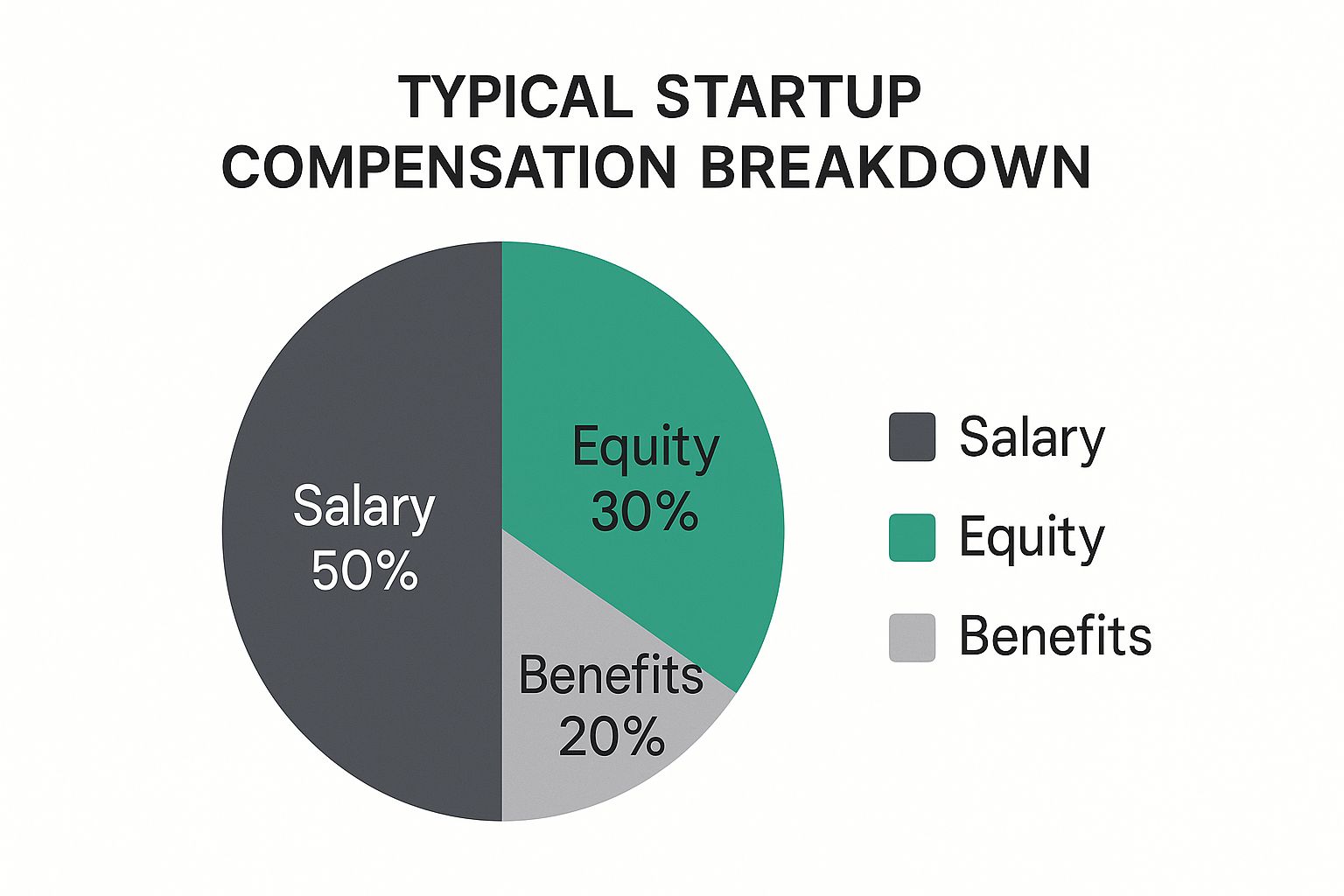Understanding The Startup Compensation Game
Startup compensation differs significantly from traditional corporate packages. It's a careful balancing act between your immediate financial needs and the potential for future wealth. Understanding this unique combination of salary, equity, and benefits is essential for navigating the startup world. It's not just about the base salary; it's about evaluating the whole picture. This guide will help you understand the key components of startup compensation and how they work together.

This pie chart shows a typical breakdown of a startup compensation package. Equity often makes up about 30% of the total, alongside salary (50%) and benefits (20%). This emphasizes the importance of looking beyond the salary and considering the potential upside of equity.
Decoding The Compensation Puzzle: Salary, Equity, and Benefits
Startup salaries are often lower than those at established companies. This is especially true in the early stages, when resources are limited. However, this lower salary is often balanced by the possibility of significant wealth through equity.
Equity, frequently in the form of stock options, grants you partial ownership in the company. If the company's value grows, so does the value of your equity. This can be life-changing for early employees, as seen with companies like Google and Facebook.
Benefits at startups can range widely. Some offer packages comparable to large corporations, while others have fewer options. Carefully review what's included and consider its value in your overall compensation assessment.
Compensation, including salaries and equity, differs based on roles, locations, and the company's growth stage. Resources like TopStartups offer databases to explore typical equity percentages. Platforms like Wellfound offer insights into startup salaries and equity. This data shows how complex startup compensation can be, with equity often playing a significant role, especially in early-stage companies. Learn more about this here.
Understanding Equity: Your Piece of the Pie
Equity holds the greatest potential for wealth creation in a startup. However, it's also the most complex part of the compensation package. There are different types of equity, like stock options and restricted stock units (RSUs), each with its own set of rules. The value of your equity is linked to the company's performance, adding an element of risk.
The Impact of Company Stage on Compensation
A startup's stage heavily influences its compensation strategy. Early-stage companies, often low on cash, lean heavily on equity to attract talent. As a startup matures and secures funding, the balance shifts towards higher salaries and more comprehensive benefits, while still offering equity as an incentive. This shift reflects the changing risk profile of the company.
The following table provides a comparison of typical compensation components across different startup stages and their relative importance.
Startup Compensation Components Comparison
Breakdown of typical compensation elements across different startup stages and their relative importance
| Component |
Early Stage |
Growth Stage |
Late Stage |
Risk Level |
| Salary |
Lower |
Higher |
Competitive |
Decreases with stage |
| Equity |
Higher |
Moderate |
Lower |
Decreases with stage |
| Benefits |
Basic |
Expanding |
Comprehensive |
Decreases with stage |
This table highlights how the balance of compensation shifts as a startup progresses through different stages. Early-stage companies prioritize equity, while later-stage companies offer more competitive salaries and benefits as the risk decreases.
Understanding startup compensation is crucial for making informed career choices. By looking at the entire package – salary, equity, and benefits – you can set yourself up for both short-term financial stability and long-term wealth.
Cracking The Equity Code Across Company Stages
Equity compensation. It's where fortunes are made and lost in the startup world. Yet, for many, it remains shrouded in mystery. This section of our startup compensation guide will demystify equity grants, explaining how they function at different company stages, from the percentage ownership offered at a seed-stage startup to the salary-percentage model favored by growth-stage companies.
Early-Stage Equity: Ownership Stakes
In the seed stage, when a company is just beginning, equity is typically granted as a percentage of company ownership. Imagine the company as a pie, each slice representing a portion of ownership. An early hire might receive a slice representing 1% ownership. This means they own that much of the company. This approach is common because early-stage startups are often low on cash, making equity a powerful incentive for attracting talent. You might be interested in: How to split co-founder equity.
Growth-Stage Equity: Salary Percentages
As companies grow and secure funding through Series A, B, and subsequent rounds, the equity model typically evolves. Instead of direct ownership percentages, equity is often granted as a percentage of an employee's base salary. For example, an employee might receive equity worth 10% of their annual salary each year. This model provides a more predictable and easily understood value, especially as company valuations become more established.
Equity Ranges Across Roles and Stages
The actual equity offered can vary significantly depending on several factors. These include the company's stage, the employee's role, and their seniority level. The value of equity in startups is closely tied to the company’s valuation and growth stage. At early-stage startups, equity is often granted as a percentage of company ownership. For example, a P3 software engineer might receive around 0.0141% company ownership, while a P3 account executive might receive about 0.0111%.
As companies mature to growth stages like Series A and B, equity grants are typically expressed as a percentage of base salary. At this point, a P3 software engineer might receive 8.5% of their base salary in equity, while an account executive might receive around 6.4%. Find more detailed statistics here.
The Impact of Valuation and Timing
Understanding how company valuation affects your equity's potential is crucial. A 0.5% stake in a company valued at $10 million is worth considerably less than a 0.1% stake in a company valued at $1 billion. Timing also matters. Early employees typically receive larger equity stakes because they are taking on more risk by joining a less established company.

Equity That Matters
The goal is to identify equity that has the potential to build wealth, not just equity that looks impressive on paper. This requires careful evaluation of the company's trajectory, the terms of the equity grant, and your own risk tolerance. By understanding the complexities of equity compensation, you can make informed decisions that align with your financial goals. This means understanding the difference between equity that could be life-changing and equity that is essentially worthless.
What's Really Happening In Startup Compensation
The startup compensation landscape is constantly shifting. Understanding current trends is essential for anyone looking to maximize their earnings and navigate this ever-changing environment. This section explores the real-time market dynamics impacting compensation, from the growing importance of equity to regional differences that can significantly affect your overall package.
The Rise of Equity
As startups vie for talent, especially with limited resources, equity has become a key component of compensation. This shift represents a move towards rewarding employees with a stake in the company’s future success, rather than relying solely on base salary. This is especially prevalent in early-stage startups where cash flow can be tight.
Regional Variations: Location, Location, Location
Your location plays a significant role in determining your startup compensation. Silicon Valley, known for its high cost of living and fierce competition, frequently offers higher salaries. However, emerging tech hubs like Austin or Denver might provide a better balance between salary and cost of living, potentially leading to greater overall financial well-being.
International markets add another layer of complexity, with compensation norms varying based on local economic conditions and cultural factors. Some regions might prioritize base salary, while others place greater emphasis on equity or benefits.
The increasing use of equity compensation in startups reflects broader trends in the tech industry. In 2025, the average tech salary saw a modest rise of 1.2% year-over-year, reaching $112,521. In contrast, equity compensation experienced a 6% jump, indicating a move toward compensation packages that value both salary and equity. This is particularly evident in APAC and ME regions, where startup equity has climbed from 7% of fully diluted equity at the pre-seed stage to 11% at the seed stage. Explore this topic further here.
Emerging Compensation Models
Innovative startups are experimenting with new compensation models. Some are exploring performance-based equity, linking equity grants directly to individual or company performance. Others are adopting flexible compensation plans, allowing employees to tailor the mix of salary and equity to their individual needs. This personalized approach to compensation can attract a broader pool of talent.
Industry-Specific Patterns
Compensation trends also differ across industries. Fintech startups, fueled by significant investment and rapid growth, tend to offer competitive salaries and attractive equity packages. Startups in sectors with longer development cycles, like biotech, may emphasize equity over immediate cash compensation.
Understanding these industry-specific nuances is vital for accurately evaluating a compensation offer. This also influences your negotiating leverage, as high-demand industries often give employees more power in compensation discussions.
By understanding the factors influencing startup compensation, you can effectively assess opportunities, negotiate strategically, and make informed decisions aligned with your career and financial aspirations. This means recognizing true value in the startup world and distinguishing genuine trends from fleeting fads.
Negotiating Like You Know What You're Worth

Many job seekers unintentionally undervalue themselves during salary negotiations, particularly in the dynamic startup world. This section offers practical strategies for navigating these conversations, no matter the company's stage. We'll explore how to pinpoint your actual market value, the art of balancing cash and equity, and tailoring your requests to a startup's budget.
Researching Your Market Value: Beyond Salary Websites
Knowing your worth is the first step to effective negotiation. Standard salary websites offer a basic overview but often miss the specifics of startup compensation.
Instead, consider these strategies:
Networking: Talk to individuals in comparable roles at similar startups. Directly discussing salary can feel uncomfortable, but focusing on the overall package and the value of equity can offer valuable information.
Company Research: Research the startup's funding, stage, and industry. A Series C company with solid funding will have different resources than a bootstrapped seed-stage startup. Understanding compensation packages for different roles is also key. You can research standard compensation for various positions, such as a Head Of Inbound Marketing.
Equity Research: Platforms like Ravio and Carta offer insights into typical equity ranges for different roles and company stages. This data can be incredibly helpful when negotiating your own equity.
Combining these methods gives you a more realistic understanding of your market value than relying solely on general salary data.
The Cash vs. Equity Balancing Act
A crucial decision in startup compensation involves balancing cash and equity. Early-stage startups tend to offer less cash but more equity, presenting a trade-off: higher potential future gains but greater immediate financial risk.
Later-stage startups typically provide more competitive salaries and benefits, with equity serving as a long-term incentive.
Think about your personal financial situation and your comfort level with risk. Do you prioritize the stability of a higher salary now, or are you willing to invest in the company's future potential with a larger equity stake? The optimal balance depends on your individual needs.
Negotiation Tactics: Beyond Base Pay
Negotiation extends beyond just salary and equity. Consider these additional factors:
Vesting Schedule: A faster vesting schedule lets you own your equity sooner, minimizing the impact if you leave the company earlier than anticipated.
Professional Development: Negotiate a budget for conferences, courses, or equipment to improve your skills and advance your career.
Benefits: Health insurance, retirement plans, and other perks add significant value to your overall compensation.
Signing Bonus: A signing bonus can compensate for a lower starting salary or help with relocation costs.
Presenting Your Value Proposition
Frame your negotiation as a mutually beneficial conversation. Emphasize your skills, experience, and how you can contribute to the startup's growth. Quantify your achievements whenever possible. For instance, instead of "I increased sales," say "I increased sales by 20% in the last quarter." This data-driven approach strengthens your position.
By researching your market value, thoughtfully balancing cash and equity, and considering negotiation points beyond base pay, you can secure a compensation package that reflects your true worth and supports your long-term financial goals.
Calculating What Your Package Is Actually Worth
Figuring out the real value of a startup compensation package can be tricky. This guide offers practical ways to understand what your offer is truly worth, especially when dealing with equity, vesting schedules, and benefits that vary widely between companies.
Modeling Equity Value: Predicting the Future
Understanding the potential value of your equity is key. This means projecting how the company might perform in the future, much like evaluating an investment. Consider different scenarios: best-case, average-case, and worst-case. Just like you wouldn't invest without analyzing potential returns, apply the same logic to your equity.
Dilution: Your Shrinking Slice
Dilution is a crucial factor that's often overlooked. As a startup grows and raises more funding, new shares are issued. This reduces your ownership percentage. For example, if you own 1% of a company and it issues an additional 1 million shares, your 1% represents a smaller portion of the now larger company. Factor in potential dilution when evaluating equity offers.
Hidden Value in Benefits: More Than Just Perks
Benefits significantly impact your overall compensation. Health insurance, retirement plans, paid time off – these perks add up. When negotiating your startup compensation, strong sales negotiation skills are important. Quantify the value of each benefit. Calculate, for example, the yearly cost of health insurance if you purchased it yourself. This shows the real value of the offered benefits. For more on startup funding, see How to get startup funding.
Comparing Apples and Oranges: Risk-Adjusted Valuation
Comparing offers requires considering risk. Early-stage startups are riskier than established companies. A 0.5% stake in a seed-stage startup valued at $10 million carries more risk than 0.1% in a late-stage company valued at $1 billion. Account for this risk difference when comparing offers.
Common Mistakes: Don't Fall into the Traps
Many people overvalue equity without considering the likelihood of a successful exit. Another mistake is ignoring the details, such as vesting schedules or clawback provisions. Avoiding these pitfalls leads to better decisions.
Tools and Resources: Making Informed Decisions
Online tools can help evaluate startup compensation. Equity calculators can model potential returns, and cap table analyzers help understand ownership and dilution. These tools provide a clearer view of your potential earnings.
Compensation Evaluation Checklist
To help you evaluate your startup compensation, we’ve created a helpful framework:
Base Salary: Does it match market rates for your role and experience?
Equity: What’s the potential value under different company performance scenarios? What are the vesting schedule terms and options exercising terms?
Benefits: What's the total value of health insurance, retirement plans, and other perks?
Dilution: How might future funding rounds affect your ownership?
Risk: What's the company's overall risk, and how does this impact your equity's potential value?
To understand this framework in more detail, consider the following table:
Compensation Evaluation Framework
Step-by-step methodology for assessing total compensation value including risk factors and scenarios.
| Evaluation Factor |
Weight |
Assessment Method |
Risk Level |
Time Horizon |
| Base Salary |
20% |
Market comparison, salary surveys |
Low |
Short-term (1-2 years) |
| Equity |
40% |
Discounted Cash Flow (DCF) modeling, comparable company analysis |
High |
Long-term (5-10 years) |
| Benefits |
15% |
Cost comparison, market benchmarks |
Low |
Short-term (1 year) |
| Dilution |
15% |
Cap table analysis, future funding projections |
Medium |
Long-term (3-5 years) |
| Risk |
10% |
Qualitative assessment, due diligence |
Variable |
Dependent on company stage |
This table helps you weigh different factors and assess compensation holistically. The weighting reflects the relative importance of each factor in a typical startup context.
By using these strategies and frameworks, you can accurately assess startup compensation, avoid common mistakes, and make informed choices about your financial future. Take control of your financial destiny in the startup world.
Avoiding Compensation Mistakes That Cost You
The startup world is rife with compensation mishaps, many of which are preventable with the right information. This guide examines frequent and expensive errors professionals make when assessing startup packages, from overestimating equity to overlooking terms that significantly affect work-life balance.
The Illusion of Worthless Equity
One of the biggest pitfalls is overvaluing equity in a struggling startup. A large percentage of ownership in a failing company is worthless. It's essential to realistically evaluate a startup's potential, considering factors like market traction, revenue, and leadership experience. Check out our guide on common startup mistakes for further information.
For instance, a 5% stake in a company valued at $1 million may seem attractive. However, if the valuation drops to $100,000, your stake’s value diminishes drastically. This underscores the importance of due diligence and a healthy dose of skepticism.
The Devil in the Vesting Details
Vesting schedules dictate when you own your equity. A common oversight is not grasping the implications of different vesting schedules. A four-year vesting schedule with a one-year cliff means you own no equity until you've worked for a full year. Leaving before the cliff vests means leaving with nothing. Also, be mindful of clawback provisions, allowing the company to reclaim vested equity under specific circumstances, such as termination for cause.
Dilution: The Shrinking Pie
Dilution happens when a company issues more shares, reducing your ownership percentage. This is a normal process as startups raise funding, but it can significantly affect your equity's value. Neglecting potential dilution can lead to disappointment, even if the company thrives. Imagine owning 1% of a company. If the company doubles its shares, your ownership is diluted to 0.5%, even if the overall value increases.
Neglecting the Importance of Benefits
Focusing solely on salary and equity can lead to overlooking valuable benefits. Health insurance, retirement plans, and paid time off significantly impact your financial well-being. Failing to properly assess these benefits can result in a less desirable compensation package than initially perceived.
The Allure of "Too Good to Be True" Deals
Some offers seem too good to be true, and they usually are. Unrealistic promises of rapid wealth or incredibly generous equity offers should raise red flags. Thorough research and healthy skepticism are vital for protecting your interests.

Spotting Red Flags: Proceed With Caution
Several warning signs during compensation discussions can indicate potential issues:
Evasive answers about company financials or equity structure: Transparency is paramount. Hesitation to share information is a concern.
Pressure to accept an offer quickly without due diligence: Take your time to evaluate the offer. Don't rush into a decision.
Dismissive attitudes towards your compensation concerns: Your concerns are legitimate. A company disregarding your financial interests likely won't prioritize your well-being.
Developing a Skeptical Eye: Protect Your Interests
Navigating startup compensation requires a discerning approach. By understanding vesting schedules, dilution, and other key factors, you can safeguard your financial interests and avoid costly errors. Learn to question assumptions, scrutinize offers, and develop the necessary skepticism to make informed decisions. This involves thinking like an investor, carefully weighing potential risks and rewards before committing your time and talent.
By avoiding these common traps, you can make better decisions about your startup compensation and maximize your potential for both short-term financial security and long-term wealth building. This allows you to select opportunities aligning with your career goals and financial aspirations.
Key Takeaways
This startup compensation guide has provided a helpful overview of navigating the complexities of startup compensation. From understanding the core elements – salary, equity, and benefits – to mastering negotiation tactics and avoiding common mistakes, you now have the resources to make informed choices. This section summarizes the key takeaways into practical strategies for startup compensation success.
Evaluating Startup Compensation Offers: A Practical Framework
Making smart compensation decisions requires a structured approach. Consider this checklist when reviewing offers:
Understand Your Market Value: Research similar roles at comparable startups. Networking and using tools like Ravio and Carta offer valuable data.
Balance Cash and Equity: Weigh your current financial needs against the potential for future gains from equity. This balance depends on your personal risk tolerance and the company's stage.
Assess the Entire Package: Don't focus solely on salary. Consider the value of benefits, professional development opportunities, and other perks.
Model Equity Value: Project your equity's potential value under different company performance scenarios. Think about best-case, average-case, and worst-case outcomes.
Negotiate Like a Pro: Proven Strategies
Effective negotiation helps you secure a compensation package that reflects your value:
Prepare Thoroughly: Understand your market value, the company's financial position, and your target compensation range.
Frame Negotiations as a Collaboration: Emphasize your skills, experience, and the value you contribute. Quantify your achievements and position yourself as a partner invested in the startup's success.
Explore Beyond Base Pay: Negotiate vesting schedules, benefits, professional development opportunities, and other perks.
Be Prepared to Walk Away: Knowing your bottom line empowers you to make decisions aligned with your financial goals.
Avoiding Costly Mistakes: Lessons Learned
The startup world has many compensation cautionary tales. Avoid these common pitfalls:
Overvaluing Worthless Equity: Don't be drawn in by a large ownership percentage in a struggling company. A large portion of a small pie is not a path to wealth.
Ignoring Vesting Schedules and Clawback Provisions: Understand when you truly own your equity. Vesting schedules and clawback provisions have a significant impact on its true value.
Neglecting Dilution: Future funding rounds will decrease your ownership percentage. Consider potential dilution when evaluating equity offers.
Falling for "Too Good To Be True" Deals: Unrealistic promises of quick riches often lead to disappointment. Maintain a healthy skepticism.
Building Long-Term Wealth Through Smart Compensation Choices
Startup compensation is more than just a paycheck. It's about building long-term wealth. By understanding equity, negotiating effectively, and avoiding common errors, you can maximize your earnings and position yourself for financial success in the dynamic startup landscape.
Tracking Your Compensation: A Template for Success
Creating a spreadsheet to track your compensation decisions can be very useful. Include important details like:
- Company Name and Stage
- Role and Responsibilities
- Base Salary
- Equity Grant (Percentage and Number of Shares)
- Vesting Schedule
- Benefit Value
- Total Compensation Value (Including Equity and Benefits)
This helps you compare offers, monitor your progress, and make informed choices aligned with your long-term objectives. It also creates a helpful record for future negotiations.
Are you a solo founder looking for a co-founder? IndieMerger connects verified founders with complementary skills. Visit IndieMerger today to learn more.